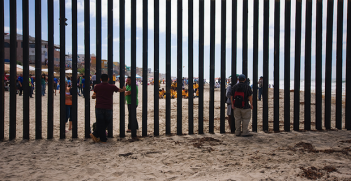After El Chapo: Drugs and Global Finance

The conviction of El Chapo in a New York courtroom was a major victory for US authorities. But in the War on Drugs that is increasingly being fought in the global financial system, America’s aggressive tactics are meeting pushback from rivals and allies alike.
The spectacle that was El Chapo’s trial concluded on 12 February in New York, seemingly to the satisfaction of its conveners. More than 200 hours of testimony, 117,000 sound files, the vetting of over a thousand potential jurors and multiple agency security details were involved in trying Joaquín “El Chapo” Guzmán Loera, one of the leaders of the Sinaloa cartel. After the guilty verdict, the US Attorney of the Eastern District of New York Richard P Donoghue declared: “There are those who say the war on drugs is not worth fighting. Those people are wrong.”
However, El Chapo’s capture has had a negligible effect on the flow of psychoactive substances, and the majority of the 50 US states, in line with public health research, oppose the federal government’s aggressive approach to drug control. His conviction can hardly be considered a major accomplishment if the goal of the War on Drugs is to reduce the harms of addiction and preventable deaths. But it is a resounding success when it comes to the continued dominance of the United States in the Western hemisphere. El Chapo was tried in a New York court, even though the majority of the murders and assaults under his command took place in Mexico. In the War on Drugs, the United States is thus both “neighbour and master.” As the federal government is the outward-looking “official” face of the United States, it can use the issue of drug policy enforcement to gain advantages and capacities in the international arena.
Global drug control and international relations
Indeed, drug control is baked into the architecture of international relations. Psychoactive substance regulation has always been a major element in the portfolio of international organisations. The United Nations Office on Drugs and Crime provides much of the global data that researchers have on comparative consumption and policing. Its work in facilitating and coordinating the global management of psychoactive substances goes back to commitments inherited from its predecessor, the League of Nations, and the first drug control treaty, the 1912 International Opium Convention. Even in the 21st century, orderly and efficacious drug control and management are seen to be part and parcel of what civilized nations do – as much a part of modern international norms and moral citizenship as a professed respect for human rights.
Thus, drug control has been one of the few consistent areas of international cooperation across political divides. It has fostered unusual bedfellows: even before the recent thaw, the two Koreas, for example, could agree on psychoactive substances. The consensus in the international community that drugs are a problem to be managed primarily by nation-states and their judicial arms – rather than governed by public health researchers or medical professionals – is more long-lived and stable than any other comparable phenomenon in modern international affairs. However, global drug enforcement also constitutes the blurry edge of action where nation states test their extraterritorial might in new directions, and the recent US attempts to develop invasive techniques to limit narcotics trafficking are resulting in pushback from rivals and allies alike.
Is the Chinese “War on Drugs” evolving?
There is ample international criticism of the US War on Drugs in more liberal European jurisdictions, but even countries that have implemented similar policies to the US war on drugs are changing their approaches to narcotics regulation. Despite a recent hard-line approach to drugs, China, for example, is experimenting with softer policies on international drug control, and it will be a country to watch in this area in 2019.
For the last decade, China has been particularly active in drug control across the southern borderlands adjoining Laos, Thailand and Myanmar. Observers have accused China of “flaunting” its extraterritorial drug policing and growing influence in Southeast Asia. How much cooperation was elicited or demanded from China’s neighbours in the pursuit of Naw Kham – a trafficker whose 2013 execution would later be televised as an anti-drugs message – is unclear.
But unlike the United States, China is starting to offer a more nuanced set of economic options to its neighbours in the name of drug control that have not been entirely unwelcome but whose impacts have been complex. Ranging from more straightforward crop substitution to building Special Economic Zones (SEZs) in the Golden Triangle to reconfigure a “lawless” landscape, it may be too soon to discern the full impact of these economic strategies. Chinese intervention in Southeast Asia and patterns of cross-border cooperation and assistance are likely to emerge in the name of drug control.
The US “weaponisation” of finance
El Chapo’s trial harkens back to an older, 20th-century phase of the War on Drugs. Nowadays, the War on Drugs is not always fought with guns in slums and exotic Latin American cities as TV shows, narco-ballads and high-profile trials of drug lords suggest. Increasingly, narcotics control is shifting to the seemingly unrelated halls of global finance. Indeed, the development of financial practices designed for use in America’s Global War on Terror were actually pioneered in the War on Drugs. The United States has used its dominance in global finance to ensure that its enforcement and regulation extend far beyond its borders.
The reach of this “weaponisation of finance” seems limited until we consider that much of the dominance of the United States in the global financial system is greater than what is readily visible. For instance, even a simple fund transfer from South Korea to its neighbour and major trading partner, Japan, usually goes through the US dollar because it is cheaper to keep reserves in a few major currencies instead of every single currency of interest to the national economy. Financial institutions, from payday lenders to banks, are open to these new complex forms of scrutiny: transactions in Bitcoin or through Paypal are not immune. Money laundering tactics common in shadow economies – such as “smurfing,” where large sums are broken up by several couriers into small sums below reporting thresholds, deposited and later reaggregated – are no match for new AI driven “know-your-customer” pattern recognition checks.
Moreover, the centrality of the United States in the global financial system gives Washington enormous leverage against foreign nations that have little interest in its drug enforcement regimes. Briefly, even if a country is not party to US sanctions or enforcement against a drug kingpin, financial institutions in that country may still act as de facto delegates of US security concerns – because they are running compliance programs, reporting and policing transactions under pressure from the US Treasury Department’s Office of Foreign Assets Control. US threats of exclusion from doing business in the United States or with the US dollar – while often issued but seldom carried out – would cripple most banks and multinationals. This is an innovative expansion of extraterritoriality: the weaponization of finance is increasingly seen as an assault on the sovereignty of US allies and enemies alike.
Pushback
Strangely, the United States seems to underestimate the rage this weaponisation of finance has induced in its allies. A quick glance at the civil enforcement record clearly shows that the largest fines have been disproportionately awarded to non-US multinationals. Frustration in China and the European Union has been growing for the past decade and is becoming ever more visible. In August 2018, French Finance Minister Bruno Le Maire said he wanted “Europe to be a sovereign continent, not a vassal, and that means having totally independent financing instruments that do not today exist.”
Will the Renminbi or the Euro become a new key currency, complicating US global drug policing? An aggressive American financial strategy that includes attempts to enforce the War on Drugs may itself help induce such an outcome, as other nations seek to decentralize the financial system. Increased calls for reform are evident in a new payments system that is designed to allow Europe, Russia and China to dodge US sanctions on Iran – to evade the same sort of financial policing exercised by the wars on terror and drugs. The techniques of financial control that constitute the weaponization of finance are incredibly powerful but are critically vulnerable. If the United States overplays its hand on financial policing to counter drug trafficking and terrorism, friends and rivals alike may explore separate, more comprehensive, payments systems that eventually place a significant portion of the global finance beyond the reach of the United States. This will have knock-on effects beyond Washington’s ability to execute the War on Drugs.
Dr Saeyoung Park is an assistant professor at Leiden University.
This article is published under a Creative Commons License and may be republished with attribution.





